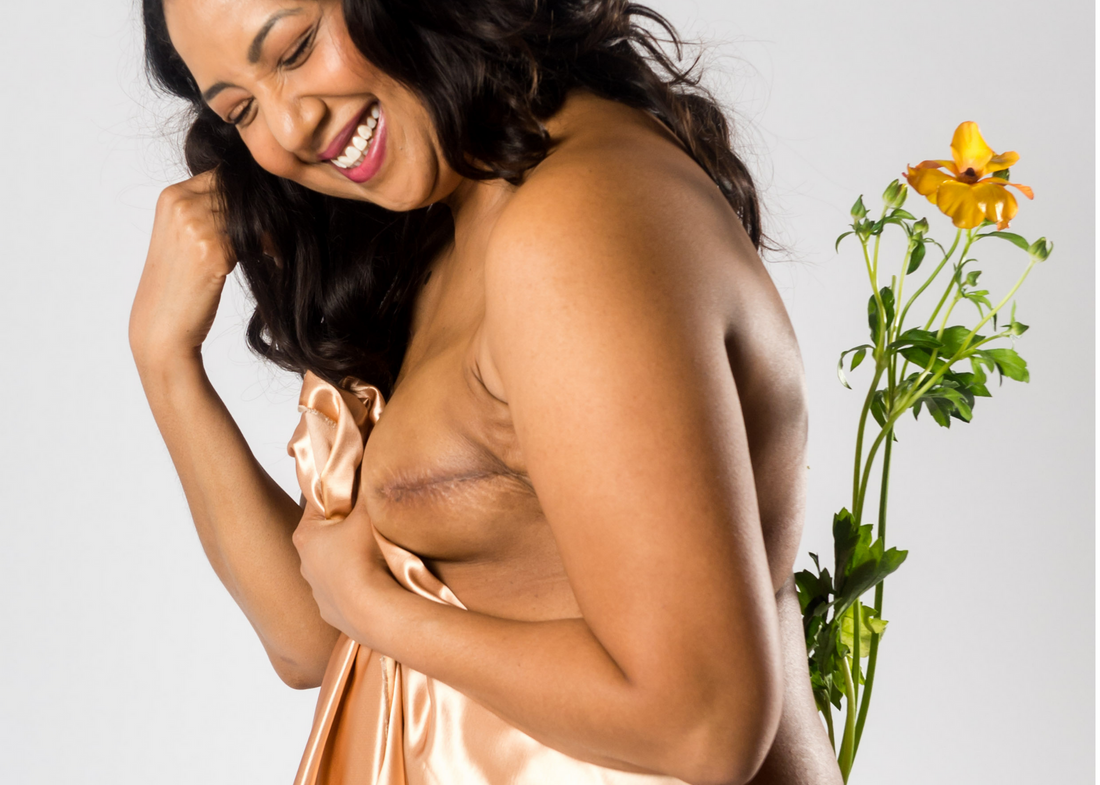
SYSK: These Breast Cancer Tests Could Save Your Life
Share
words by Dr Mare (she/her), OBGYN @bookedwithdrmare
In the United States, approximately 1 in 8 individuals with breasts will develop invasive breast cancer. While 5 year survival rates are near 100% for localized cases, that number drops to 30% for metastasized breast cancer (meaning it’s spread to other parts of the body).
Early screening and testing for breast cancer could have a massively positive impact on these survival rates, treatment options, and long-term health. While there is still so much we don’t understand about cancer, it’s clear that the outcomes shift dramatically when breast cancer is diagnosed early. Prevention is (part of) the cure.
BRCA: The Breast Cancer Gene
The BRCA genes have been a hot topic within the medical community for years now, but many folks still don’t know that much about them. You’ve come to the right place.
BRCA stands for the BReast CAncer genes of which there are two: BRCA1 and BRCA2.
These genes are actually tumor suppressor genes that normally prevent cancer. However, a mutation in one or both of these genes known as Hereditary Breast and Ovarian Cancer (HBOC) syndrome increases one’s risk of cancer of the breast, skin (melanoma), ovarian, pancreatic, or prostate.
Factors that Increase the Risk of BRCA Mutation
These mutations are rare in the general population — the prevalence in the U.S. is about 1 in 500 people — but this rate varies by ethnic group, and your chances increase depending on your family health history.
Other factors that increase one’s chance of BRCA mutation include:
A family history of cancer Ovarian, pancreatic, or prostate cancer (in addition to breast)
The closeness of any affected family members First degree relatives like a parent or sibling are more concerning than cancer in more distant relatives
The number of family members affected
The age when relatives were diagnosed Risk increases when relatives are diagnosed at a younger age; under 30 is more concerning)
Depending on your personal and familial health history, testing may be helpful in some cases—but not everyone needs to be tested. If you or a blood relative have or had breast cancer, talk to your doctor to discuss your options and concerns.

Who Should Get Tested
Expert groups have developed guidelines for who should and should not get BRCA testing. These guidelines don’t always agree with each other, and not all doctors agree with them, but they provide a solid framework to start with.
One thing most doctors agree on? Not all folks with breast cancer need genetic counseling or testing. Certain factors will prompt your doctor to suggest testing.
You are at higher risk if you have one or more of the following:
- A personal history of breast cancer diagnosed before age 45
- A personal history of breast cancer diagnosed before age 50, plus a second primary breast cancer (rather than a recurrence of the first one)
- A personal history of triple negative breast cancer diagnosed at age 60 or younger
- A personal history of two or more types of cancer
- A personal history of ovarian cancer
- A personal history of male breast cancer
- One or more relatives with breast cancer are diagnosed before age 50
- Two or more relatives are diagnosed with breast cancer at any age
- One or more relatives with ovarian cancer
- One or more relatives with male breast cancer, or two or more relatives with prostate cancer or pancreatic cancer
- A personal history of breast cancer and Ashkenazi (Eastern European) Jewish ancestry
- A personal history of prostate cancer or pancreatic cancer with two or more relatives with BRCA-associated cancers
- A history of breast cancer at a young age in two or more blood relatives, such as your parents, siblings, or children
- A relative with a known BRCA1 or BRCA2 mutation
- One or more relatives with a history of cancer that would meet any of these criteria for gene testing

Types of Genetic Testing: The GAIL Model
While mutations in one of the BRCA genes are the cause of most hereditary breast cancers, other inherited gene mutations can increase one’s risk for breast cancer. Testing for changes in these genes is done less often, but it may be considered in certain situations.
There are other mathematical models that use family and personal history to help estimate the risk of having a BRCA mutation, but for those who do not have a history of breast cancer, they will likely use a risk assessment tool like the GAIL model to determine your estimated lifetime risk.
While widely used, this model does have its shortcomings. It’s based on studies that almost exclusively studied white women and, as a result, is not equally accurate for Black, Hispanic, Pacific Islander, or Asian patients.
Read More Understanding the Racial Disparities in Healthcare
What Not to Do: At Home Genetic Testing
There are several direct-to-consumer genetic tests now available. In theory, at-home tests are a much easier (and less expensive) route than going through a doctor. Unfortunately, these at-home tests are unreliable, or inaccurate; they generally only check for a handful of BRCA gene mutations, while there are over 1,000 known mutations.
In fact, the one at-home genetic test approved by the FDA looks for three BRCA mutations, leaving thousands of mutations untested and undetected. These tests also don’t come with any of the benefits of a face-to-face genetic counseling, which is integral in interpreting results and managing a course of action.
While these tests may help with cancer prevention, they cannot diagnose anything and should not be used as a substitute for cancer screenings or genetic counseling. Routine screening with yearly mammograms is recommended for all patients and is one of the best preventive measures we have against breast cancer.

READ MORE How to Give Yourself A Self Breast Exam
Genetic Counseling
Genetic counselors are specially trained to review your family history in detail to determine the likelihood of a hereditary cancer syndrome like HBOC. During the visit, they will review what genetic testing entails, and explain what the tests might be able to show, which can help patients decide if genetic testing is right for them.
Patients may simply decide they don’t want to get tested for personal or mental health reasons, since this information can bring forth a lot of anxiety and stress that some people don’t want to deal with.
Once someone does decide to get tested, the genetic counselor will have a discussion about what the results mean — both for the patient and their family members — and next steps.
GOOD TO KNOW This may come as a surprise, but a gynecologist does not get specialized training on breast diseases. As a result, patients are often referred to a breast specialist or surgeon — doctors who have specialized training in all breast diseases. They can be very helpful in deciding to get genetic testing and in reviewing the results.
Testing for BRCA Mutation
Genetic testing may be done to look for one (or several) specific BRCA mutation(s) from a blood, saliva, or cheek swab sample. Someone who is undergoing testing because a family member has a known BRCA mutation will be tested specifically for that mutation. But if there’s no reason to suspect a specific gene mutation, testing will likely look for multiple mutations.

Understanding the Results
It’s crucial to understand what genetic testing can and can’t tell us and to know the benefits and risks prior to having the testing done. Genetic testing is not perfect, and for some, the results are not as clear as they’d like, as the results can be confusing. That’s why It’s important to review them with a genetic counselor, who can explain what the results mean for you and your family members.
GOOD TO KNOW Those who get negative results should not assume that they no longer have a risk for breast and ovarian cancers. On the other hand, those who test positive should know that this doesn’t mean they are definitely going to develop cancer.
Positive for a mutation that was tested for When a patient has a BRCA mutation, counseling is provided to discuss what steps can be taken to lower the risk of cancer. If someone already has a diagnosis of breast cancer, a positive result may affect treatment options. Certain prophylactic (i.e., preventive) surgeries may also be suggested and/or the recommended screening tests may be different.
Negative for a mutation that was tested for A negative result can be reassuring, but it’s important to understand that even those with negative results should not assume that they’re not at risk, or that they will never get breast cancer. In fact, the average lifetime risk is still 12% in people without inherited mutations. Unless a patient is tested for every single mutation possible, there is a chance that a certain mutation that wasn’t specifically tested for is present.
Positive for a variant of unknown significance (VUS) The test found a gene mutation (variant), but it’s not clear how that particular mutation affects one’s risk of breast cancer.
Inconclusive The test may not be able to conclude one way or the other that someone has a gene mutation. There could be a few reasons for this result, and a repeat test may be done
If you have any concerns about your risk for breast and ovarian cancer, or you have any family history of these cancers, make sure to talk to your doctor so that they can assess whether or not they would recommend testing for you. And remember — the choice to get tested is always yours.
GOOD TO KNOW Breast cancer treatment can induce early onset menopause, causing estrogen levels to drop, vaginal dryness & mood swings. Self-care is a way to strengthen dignity, hope & self-esteem.
Soothe stress in body & mind with organic ingredients that won't interfere with medication, hormones, or pheromones. SHOP NOW
Further Reading
The Intersection of Sexual and Mental Health
What to Expect During Pregnancy & Postpartum
Meet Yael Borensztein: Doula & Lactation Specialist
5 Ways to Practice Self Care for Free
Meet the Author

Dr Mare (she/her), OBGYN @bookedwithdrmare
Dr. Marieme Mbaye is Momotaro Apotheca’s Medical Advisor. She is an obstetrician and gynecologist focused on giving patients the tools they need to take charge of their health. She has a wide range of surgical and procedural experience, including robust robotics and laparoscopic training. She received her MD from the University of Tennessee Health Science Center, and her BS from Yale University.
Read More from Dr Mare
How to Give Yourself a Self Breast Exam
Momotaro Apotheca and its materials are not intended to treat, diagnose, cure or prevent any disease. All material on Momotaro Apotheca is provided for educational purposes only. Always seek the advice of your physician or other qualified healthcare provider for any questions you have regarding a medical condition.


